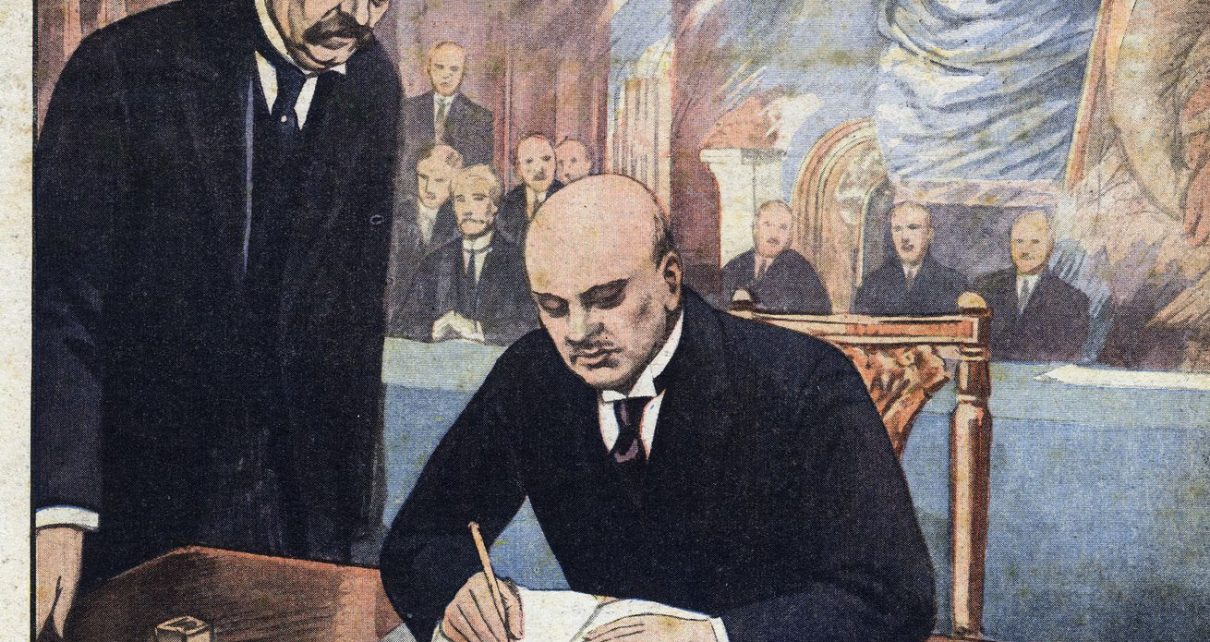
Putin is violating a surprisingly powerful international law, and other nations are punishing him accordingly.
The Treaty of Versailles, formally ending World War I and establishing a new postwar order, began with a charter for a new organization. Called the Covenant of the League of Nations, the new body was meant to resolve international disputes peaceably — and, crucially, it committed members to “respect and preserve as against external aggression the territorial integrity and existing political independence of all Members of the League.”
That promise, Article X of the Covenant, was the work of then-US President Woodrow Wilson. Wilson chaired the committee at the 1919 Paris Peace Conference that drafted the covenant, and historian John Milton Cooper, in his book Breaking the Heart of the World: Woodrow Wilson and the Fight for the League of Nations, describes Article X as “Wilson’s singular contribution to the Draft Covenant.”
Wilson’s Article would help doom the League. Opponents of US entry into the League, like Sen. Henry Cabot Lodge (R-MA), argued that the provision obligated the United States to jump to the defense of any country around the world, entangling it in conflicts it had no part in. Lodge called it “the most important article in the whole treaty,” which would send “the best of our youth” on a foolish “errand” to “guarantee the political independence and territorial integrity of every nation on earth.”
These skeptics eventually won out. The US would never join the League, a fact that contributed heavily to its eventual failure in the runup to World War II. If remembered at all, the League of Nations is usually remembered as an embarrassing failed experiment. But some of the experiment has succeeded.
I’ve been thinking about Article X amid Russia’s invasion of Ukraine, which obviously and fundamentally threatens the territorial integrity and political independence of that country. No international law stopped Russian troops from crossing the border, but in some ways, this is the exception that proves the rule initially laid down in Article X.
Moscow’s actions are so shocking precisely because they violate what is now accepted as a strong norm against territorial conquest by nations. And that norm started with idealistic ventures in the wake of WWI, including Article X and an even more utopian effort: the Treaty for Renunciation of War as an Instrument of National Policy, often called the Kellogg-Briand Pact, signed in 1928.
The war in Ukraine is not evidence that this norm has gone away. If anything, the current crisis is an example of the norm working as intended: Once it was violated by Russian President Vladimir Putin, he faced overwhelming (but non-military) punishment from the international community for that violation.
How war for conquest used to work
Tanisha Fazal, a professor of political science at the University of Minnesota, argues that Article X helped originate what she calls the “norm against conquest.” In her book State Death: The Politics and Geography of Conquest, Occupation, and Annexation, Fazal examines violent state deaths, or cases when a whole country ceases to exist, at least for a period, due to war. Think of instances like the 1795 destruction of Poland, which resulted in the country being carved up by Prussia, the Habsburgs, and the Russian Empire. (Poles would not regain national sovereignty for more than a century.)
Such violent state death through conquest used to be quite common. Indeed, Germany and Italy exist as nations largely due to their most powerful precursor states (Prussia and Piedmont-Sardinia, respectively) conquering and absorbing smaller states like Hanover or Sicily.
And this form of war for conquest was institutionalized in law and just war reasoning. In their 2017 book The Internationalists: How a Radical Plan to Outlaw War Remade the World, Yale law professors Oona Hathaway and Scott Shapiro note that prevailing norms around war before the 20th century were not just permissive but actively sympathetic to wars of conquest. They cite the work of Hugo Grotius, the 17th-century Dutch jurist and arguably the father of international law, who argued that states have a right to territorial conquest as a last resort for resolving disputes.
Grotius believed that war was a bit like a lawsuit: it was meant to redress a wrong, and one way to redress a wrong is to seize the property (including the land) of those who wronged you. He believed that all human beings have an inherent right to violently defend their life and property. When people got together and formed states, they transferred that right over to the state. The state, therefore, as an extension of its right to defense, has a right to wage war to redress wrongs, and to seize property as damages for the wrong done.
“He invents social contract theory precisely to defend the right of war for states,” Shapiro mordantly observed to me. These kinds of wars did need some kind of justification, which was often made in writing. But the justification didn’t have to be very good.
While he offered the best summation of this attitude toward conquest, Grotius was reflecting a much broader tradition that predominated in pre-20th-century Europe, and in other continents. Hathaway and Shapiro assembled a massive global database of “war manifestos” in which politicians set out their reasons for war. Many of them fit Grotius’s “war as a lawsuit by other means” model.
The earliest one they include, issued by Holy Roman Emperor Maximilian I against King Charles VIII of France in 1492, justifies the war by noting that Charles stole Maximilian’s wife. But you can trace the tradition even earlier. “The Hebrew Bible is a war manifesto: One of its functions is to legitimate the conquest of the land of Israel,” Shapiro notes.
The decline of conquest
Then, in the 20th century, and especially after the end of World War II, something changed. “Violent state death has dramatically declined since 1945 in particular,” Fazal told me. “Attempts to take specific territory haven’t been declining the same way, but successful conquests against smaller state territories have been declining.”
“Dramatic decline” isn’t the same as nonexistence, of course. Violent state death still happens; North Vietnam conquering the South in 1975 probably qualifies. All the same, as Fazal writes in her book, “State death has changed dramatically, with voluntary unifications (à la Germany and Yemen) and [voluntary] dissolutions (à la the Soviet Union and Czechoslovakia) far outpacing the rate of violent state death.”
Fazal gives at least some of the credit for this transformation to the norm against state conquest first established in the Covenant of the League of Nations. The norm’s proclamation and subsequent enforcement by one of the world’s two hegemons (the United States) after 1945 has helped make territorial conquest taboo.
/cdn.vox-cdn.com/uploads/chorus_asset/file/23288261/515302928.jpg) Bettmann
BettmannHathaway and Shapiro also credit international norms for a decline in wars of conquest. They trace the transformation not to the League of Nations, but to the 1928 Treaty for Renunciation of War as an Instrument of National Policy. Often called the Kellogg-Briand Pact, after signers US Secretary of State Frank Kellogg and French Foreign Minister Aristide Briand, the treaty’s text is so short I’m going to quote it in its entirety:
ARTICLE I
The High Contracting Parties solemnly declare in the names of their respective peoples that they condemn recourse to war for the solution of international controversies, and renounce it, as an instrument of national policy in their relations with one another.
ARTICLE II
The High Contracting Parties agree that the settlement or solution of all disputes or conflicts of whatever nature or of whatever origin they may be, which may arise among them, shall never be sought except by pacific means.
The pact, Hathaway told me — all 78 words of it — “was the first time the world outlawed war.” It marked an explicit repudiation of the old model of Grotius and others justifying wars of conquest. In outlawing war, it more importantly denied countries the benefits of war, like new territory. Spoils — at least of territory — could not be kept. “They not only prohibited the use of force but they took away the legal consequences or benefits of going to war,” Shapiro says.
And Hathaway and Shapiro marshal evidence that supports both their thesis and that of Fazal’s: Wars of conquest became less common after the establishment of a norm against them. Hathaway, Shapiro, and their Yale research assistants compiled a database covering the years 1816 through 2014 that found 254 “instances of territorial change that were possible conquests.” These included both full “state deaths” and seizures of merely part of a rival country.
From 1816 to 1928, the year Kellogg-Briand was written, the average state had a roughly 1.33 percent chance of losing territory due to conquest, with an average loss of about 295,000 square kilometers (roughly the land area of Arizona). From 1928 to 1948, the first 20 years of the pact, things were if anything slightly worse: the average state had a 1.8 percent chance of losing territory to conquest, and an average loss of about 241,000 square kilometers. Closer to Michigan than Arizona, but still not great. Much of this conquest happened during World War II, and was largely reversed, which Hathaway and Shapiro take as evidence of the anti-conquest norm taking root.
From 1948 to 2014, everything changed. The odds of a state losing territory in a given year fell from 1.33 percent to 0.17 percent. Put differently, the odds of being conquered fell by over 87 percent. And the average territory conquered was only 14,950 square kilometers (Connecticut-sized). “An average state before 1928 could expect one conquest in a human lifespan,” Hathaway and Shapiro write. “After 1948, the chance an average state would suffer a conquest fell from once in a lifetime to once or twice a millennium.”
This is a dramatic change, and many scholars, from Hathaway and Shapiro to Fazal and others, credit the establishment of an international norm against conquest as key to that change.
There were other factors, of course. The emergence of nuclear weapons and nuclear deterrence between great powers, which sharply disincentivized open war between them, likely played a major role in reducing conquest, too. The process of decolonization undoubtedly affected rates of conquest, though arguably by increasing them (many newly independent states, like India and Indonesia, executed land grabs to firm up their new borders).
But the norm itself matters too.
The non-conquest norm after Ukraine
One might think that the Russian invasion of Ukraine undermines this hopeful story. That’s not necessarily so. A norm’s existence is not undermined simply by its violation. We have a norm against murder; the existence of Ted Bundy did not cause that norm to suddenly not exist. But if Ted Bundy had not been caught and effectively punished, the norm against murder would have taken a hit.
And Hathaway and Shapiro note that the overwhelming Western response to Russia’s invasion exemplifies how the norm against conquest has traditionally been enforced. Sometimes, yes, it is enforced through military responses, like the UN missions that reversed North Korea’s invasion of South Korea and Iraq’s invasion of Kuwait. Harry Truman famously dubbed the former a “police action,” to further the point that it was an international institution enforcing an international law through force.
But in other cases, particularly those implicating one or more of the five veto-wielding permanent members of the UN Security Council — which Russia is — such action is impossible. The Soviets were able to quasi-conquer much of Eastern Europe when the UN was still in its infancy and so could not do much to collectively punish them for this violation.
For subsequent offenders, punishment has usually taken the form of “outcasting”: the use of economic sanctions and other tools to punish norm violators.
The conjunction of the norm against conquest and sanctions is nearly as old as the norm itself. “Sanctions were invented during this period to enforce Kellogg-Briand,” Hathaway said. “There were sanctions before, but they were prohibited by non-belligerents against states involved in conflict.”
France could sanction goods from Italy — but doing so would be establishing a state of war between the two, and violating norms of neutrality. It was after Kellogg-Briand that economic sanctions became conceptualized as alternatives to war meant to enforce certain norms — rather than a continuation of war by other means.
Cornell historian Nicholas Mulder’s recent history of sanctions, The Economic Weapon, also gives a central role to Kellogg-Briand and the Covenant of the League of Nations in their rise. When Japan, a signatory to the pact and member of the League, invaded Manchuria (belonging to China, another signatory and League member) in 1931, world leaders were left without any existing military, political, or economic methods to enforce these new rules against conquest. Soon, outcasting emerged as the preferred response. Secretary of State Henry Stimson articulated the “Stimson doctrine,” in which such territorial changes would not be recognized by the United States.
While President Herbert Hoover opposed sanctions, other prominent leaders, like influential Columbia University president Nicholas Butler, proposed them as a natural enforcement mechanism. Later, when Italy attempted to conquer Ethiopia in 1935, “most of the world’s sovereign states united in the first multilateral economic sanctions regime in history,” Mulder writes.
Ending conquest is, of course, a noble aim, but it’s worth being a bit wary of this regime we’ve used to replace it. Fazal notes that some of our best evidence that the norm against conquest has hardened comes from contexts in which states do other harmful things because of it.
“There’s been an increase in foreign-imposed leader changes since 1945,” she told me. Think of Vietnam invading Cambodia to depose the Khmer Rouge in 1978, or the US invading Iraq to depose Saddam Hussein in 2003. “You’re foreclosing the option of violent state deaths, so states have to turn to alternative means,” Fazal continues.
Similarly, Fazal told me, secessionism has increased, which is a natural consequence of a no-conquest norm. (“The value of becoming a state has increased: you have to worry less about being taken over by your neighbor.”) Scholars like American University’s Boaz Atzili have argued that the norm has weakened state capacity in places like the Democratic Republic of the Congo. Part of why states emerge and develop more competence is to defend themselves against foreign invaders. If that’s less of a concern, it stands to reason states will be weaker, and more subject to internal division.
/cdn.vox-cdn.com/uploads/chorus_asset/file/23288283/1238829924.jpg) Anton Novoderezhkin/TASS via Getty Images
Anton Novoderezhkin/TASS via Getty ImagesAnd the “economic weapon” used to enforce the norm can often constitute a form of collective punishment that would be widely considered morally unacceptable in any other context. The current sanctions regime against Russia, encompassing limits on the central bank that are threatening to cause a recession and massive inflation in the country, are “the thermonuclear bomb of finance,” Shapiro says.
If the international community had responded to the Russian invasion by bombing Russian civilians, that would be a completely unambiguous war crime. Forcing a recession and hyperinflation is not as grave a moral violation — but it is far from bloodless, and follows a similar logic of collective punishment. Such sanctions may still be a moral course of action if they are truly necessary to enforce the no-conquest norm, and save millions of lives in the future. But the cost for the Russian people should certainly give everyone involved pause, at the very least.
In any case, we have learned in the past week that the no-conquest norm has extremely influential and vigorous enforcers. The question is not, “Do we have an international order anymore?” The question is, “How do we reap the benefits of this order without imposing unacceptable punishments on those who violate it?”




